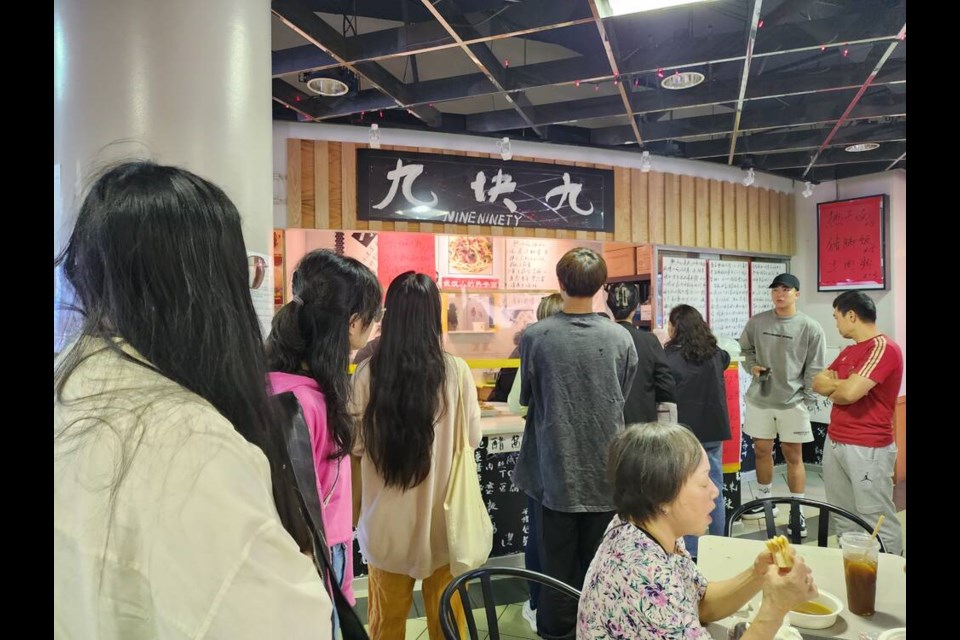The Lineup column explores Richmond businesses that have the longest lineups (or hidden gems), and the stories behind them. Have a tip? Let us know by emailing [email protected]
I’ll admit – I’m a fan.
As someone who was born and raised in Wuhan – a city in central China people had barely heard of until 2019 – “hot dry noodles” are the signature and business card of the city.
But I didn’t expect them to be this popular in Richmond.
When I found out that Nine Ninety, an authentic hot dry noodles restaurant, opened in Richmond in 2021, I could not describe how happy I was.
Every weekend, if I had time, I would go to the President Plaza mall - at No. 3 and Cambie roads - and join the lineup.
The dish is “simple” – boiled noodles mixed with sesame sauce-based jam and pickles and sprinkled with spring onion – but Wuhanese are very picky with the taste.
“Their noodles are very authentic. Every week I come to have a bowl of the noodles, otherwise I will miss it,” said a Richmond resident in a recent lineup, whose last name is Fang.
“Wuhan people have a special liking for hot dry noodles. It is well-known to every household and can be found in every street and alley. It is a taste of the hometown.”
Some customers never had them before and became a regular after being brought here by their friends from Wuhan, such as Yuan Li.
“It tastes like the snacks I had in China, simple but tasty and comforting,” said Li.
“And it opened during the pandemic when there were sort of stereotypes around Wuhan. This restaurant is like a quiet reminder that Wuhan is not just associated with COVID-19 or a name in the news, it is a place where there are people living there with their own food and culture.”
Ensuring authenticity from first step
But Mike Mei, owner of the restaurant who moved to Richmond in 2017 from Wuhan, said he didn’t think that much when he opened the restaurant and chose that time because “the lease was cheaper.”
“I just had two goals in mind: make a living to support me and my family here in Canada, and make authentic hot dry noodles for Wuhanese people here. I didn’t think of anything else,” said Mei.
To replicate the original noodle tastes as much as possible, the former chef did many experiments but still found something was missing.
“Then I realized it was the noodles – they don’t sell the same type of noodles here in Canada. So I decided to make them myself to make the dish authentic from the first step,” said Mei.
That’s why the restaurant is closed after 4 p.m. – Mei spends three hours making fresh noodles from flour every evening. He is also strict on the ingredients, from what spring onion to use to importing the sesame sauce and pickles from China.
“It all affects its taste,” he said.
There are customers coming from all over North America for the noodles and once a customer started crying while eating them because she missed home.
“I was also touched. At that moment, nostalgia was amplified by this bowl of noodles,” said Mei.
Long history of breakfast culture
I believe what he said was true. People in Wuhan are obsessed with breakfast and the city has a long history of breakfast culture – which hot dry noodles are a key part of.
Restaurants open at 5 a.m. offering all kinds of hot breakfast – buns, soup noodles, fried noodles, dumplings etc. and people gorge on them or grab one on the go before starting their day.
After living in Vancouver for 10 years and having tasted the best sushi, curry, steaks, dim sum, etc., I’m still not used to the fact that I’m not woken up by a bowl of noodles in the morning.
It’s hard to trace why hot dry noodles became an essential part of the Wuhan culture. Maybe because it’s like the people in the city – straightforward, down to earth and sometimes having a hot temper (Wuhan is one of the hottest cities in China in summer).
“That’s your understanding. My understanding is it’s convenient, filling and affordable,” said Mei with a laugh. He has kept the noodle price at $7.99.
“It’s like those most ordinary, inconspicuous things around you in life – they are usually the ones that you miss the most when you lose them.”
Someone has offered to invest in Mei’s business to open more stores, but he didn’t accept the money.
“It will be harder to control the quality and I don’t want to lose face for Wuhanese. As long as my family can make a living in Richmond and settle down here, I’m happy,” he said.
“If a person can do one thing very well in a life, that’s enough.”



